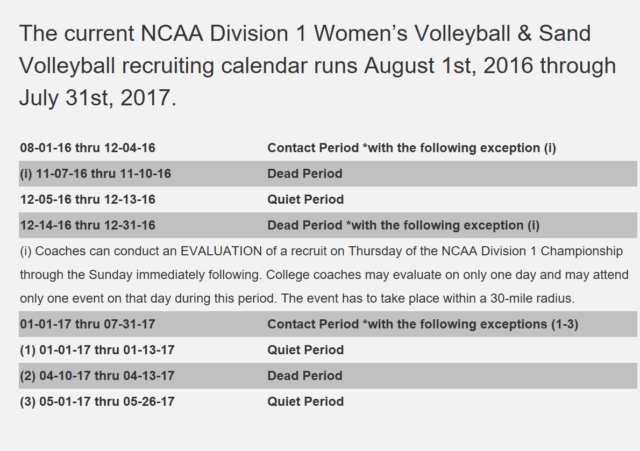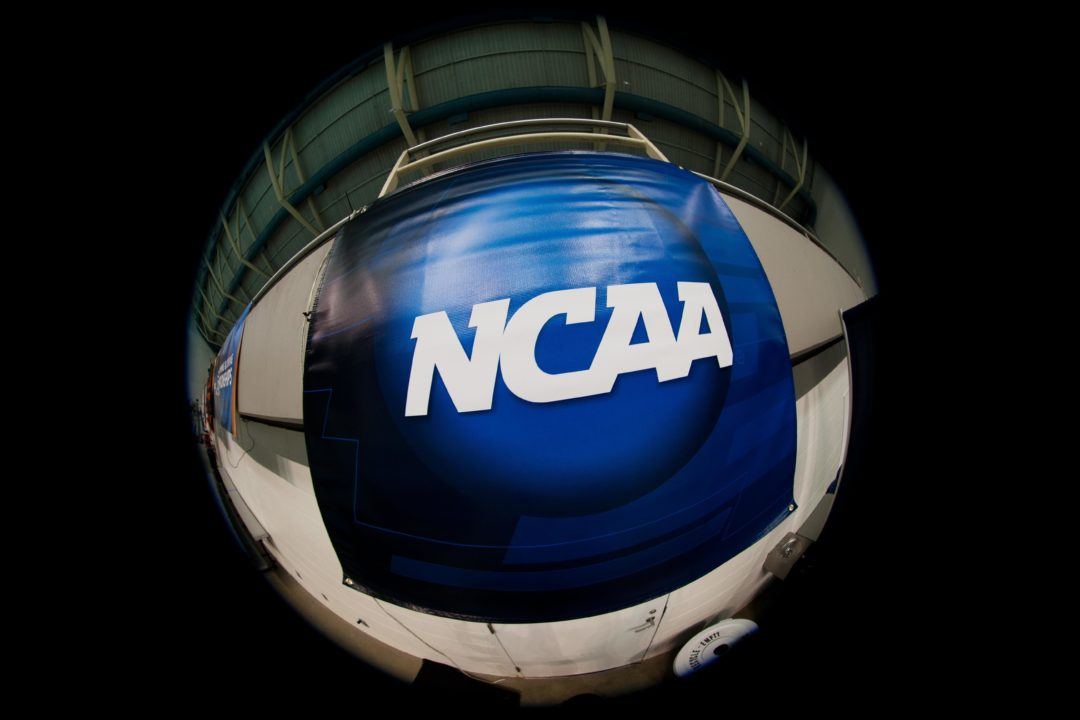The spring season ’tis the season for girls club volleyball, college recruitment, and SAT scores. As club volleyball is getting started the possibility of playing college volleyball is in the horizon. NCAA volleyball recruiting rules are confusing so here is a high-level break down of the do’s and don’ts when it comes to being recruited.
There are certain rules and restrictions that apply to the prospective student-athlete as well as the college coaches. For example, college coaches can not contact you or evaluate you more than 7 times during your senior year and coaches can not contact you personally more than 3 times during senior year.

Courtesy of: recruitlook.com
Recruitlook.com has produced a calendar for the 2016-2017 recruiting process and helps state when the dead periods are and when the quiet periods are. A dead period is when a college coach is not allowed to have face-to-face contact with college-bound student-athletes and their parents. College coaches are only allowed to write emails or call during a dead period. A quiet period is when communication with student-athlete and parents from college coaches happen on that coach’s college campus. Contact period is when the college coach and the student-athlete can communicate freely with each other either face-to-face or over the phone or email.
Former assistant coach at Virginia Tech for 11 years, Shelbylynn Adair, said that one thing perspective student-athletes should do when it is recruiting time is reach out and call desired schools coaching staff often.
“Reach out and call the schools that you have interest in attending,” said Adair. “I receive dozens of emails everyday and tag those players in the database. However when a PSA (potential student athlete) calls me, then I know she is serious about attending our university.”
For a complete definition explanations for being recruited go to NCAA.org.
During the club season you will be playing all over the country at different qualifying tournaments and this is where you will be heavily recruited. College coaches will give their business card to your club coach and that will show what colleges have interest. Colleges can also mail university questionnaires to your home where you will have to fill out and mail back.
Once interest is expressed you will be asked to go on an unofficial visit or official visit. An unofficial visit is a paid trip by the student-athlete or parents to the college and only includes 3 free home sporting event tickets. An official visit is when the college pays for the transportation, room and board, three meals a day for parents and student-athlete, and 3 tickets to an at home sporting event such as a football game.
The end goal is to receive an offer from your desired college as a scholarship player or as a walk-on position. A walk-on position offer is where the coach wants you on his or her team but doesn’t have enough scholarship money in the budget to offer you a scholarship. All athletic scholarships in volleyball, as a head count sport, are full scholarships as determined by the school’s cost of attendance calculation. There may still be financial aid available to walk-on athletes though, so don’t despair if your perfect fit doesn’t offer you a scholarship. Scholarships can also be given later, after a student has played a season or two.
If you get offered a scholarship offer you will receive a National Letter of Intent (NLI) which is a document stating that you agree to play D1 or D2 volleyball at desired college. This is like a contract and by signing this contract you agree that you will receive financial aid if you stay NCAA eligible during your time as a student-athlete. NCAA student-athletes have the responsibility of staying academically eligible as well as medically. You have to keep above a 2.0 GPA as well as pass random school and NCAA drug tests.
When you are being recruited and you have signed your NLI you then will need to call the other universities that you were interested in and notify them that you have decided to pursue your college career at another university. Once you have signed your NLI and you decide that you want to back out of your commitment, you must get a release from the coach officially stating that you have terminated your NLI. Verbal commitments are non-binding.
It is a lot to take in but the recruiting process is suppose to be fun and exciting. Yes it is awkward to call college coaches and build a relationship over the phone or email first, but that is just the way the game is played.
Warning!! After you have verbally committed and signed an NLI start studying for your SAT and ACT scores because even though you are signed as a student-athlete you must get into the university first. Remember you signed to be a student-athlete not an athlete-student. Players have gone all the way to their senior spring semester in high school committed and signed to one school, only to not perform well on the SAT and to have to terminate their NLI and start all over again with only a few months left before season starts.
So focus on playing hard during club season and don’t get nervous when you see your desired college come and watch you play. It is normal to have a bad play or a bad game just stay focused and have fun.

Leave a Reply